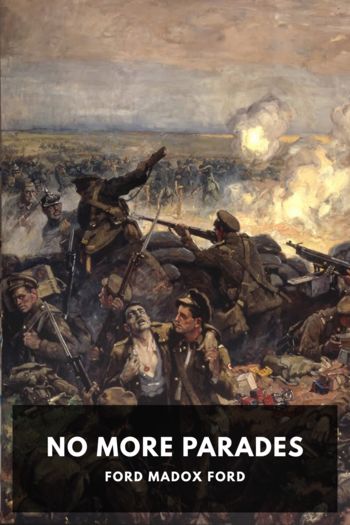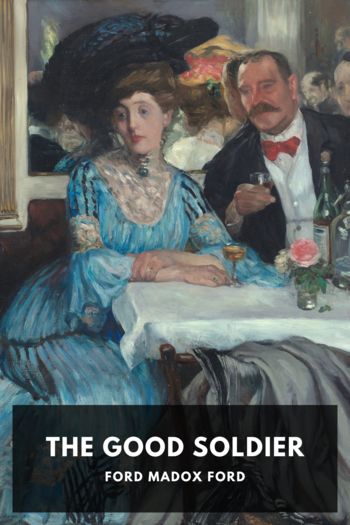Some Do Not … by Ford Madox Ford (story read aloud txt) 📕

- Author: Ford Madox Ford
Book online «Some Do Not … by Ford Madox Ford (story read aloud txt) 📕». Author Ford Madox Ford
Ruggles, however, hadn’t any pointers as to whether or no or to what degree he had really damaged his roommate’s brother. He had talked in what he considered to be the right quarters, but he hadn’t any evidence that what he had said had got through. It was to ascertain that that he had called on the great lady, for if anybody knew, she would.
He hadn’t definitely ascertained anything, for the great lady was—and he knew it—a great deal cleverer than himself. The great lady, he was allowed to discover, had a real affection for Sylvia, her daughter’s close friend, and she expressed real concern to hear that Christopher Tietjens wasn’t getting on. Ruggles had gone to visit her quite openly to ask whether something better couldn’t be done for the brother of the man with whom he lived. Christopher had, it was admitted, great abilities; yet neither in his office—in which he would surely have remained had he been satisfied with his prospects—nor in the army did he occupy anything but a very subordinate position. Couldn’t, he asked, Glorvina do anything for him? And he added: “It’s almost as if he had a bad mark against him. …”
The great lady had said, with a great deal of energy, that she could not do anything at all. The energy was meant to show how absolutely her party had been downed, outed and jumped on by the party in power, so that she had no influence of any sort anywhere. That was an exaggeration; but it did Christopher Tietjens no good, since Ruggles chose to take it to mean that Glorvina said she could do nothing because there was a black mark against Tietjens in the book of the inner circle to which—if anyone had—the great lady must have had access.
Glorvina, on the other hand, had been awakened to concern for Tietjens. In the existence of a book she didn’t believe: she had never seen it. But that a black mark of a metaphorical nature might have been scored against him she was perfectly ready to believe and, when occasion served, during the next five months, she made enquiries about Tietjens. She came upon a Major Drake, an intelligence officer, who had access to the central depot of confidential reports upon officers, and Major Drake showed her, with a great deal of readiness, as a specimen, the report on Tietjens. It was of a most discouraging sort and peppered over with hieroglyphics, the main point being Tietjens’ impecuniosity and his predilection for the French; and apparently for the French Royalists. There being at that date and with that Government a great deal of friction with our Allies this characteristic which earlier had earned him a certain number of soft jobs had latterly done him a good deal of harm. Glorvina carried away the definite information that Tietjens had been seconded to the French artillery as a liaison officer and had remained with them some time, but, having been shell-shocked, had been sent back. After that a mark had been added against him: “Not to be employed as liaison officer again.”
On the other hand, Sylvia’s visits to Austrian officer-prisoners had also been noted to Tietjens’ account and a final note added: “Not to be entrusted with any confidential work.”
To what extent Major Drake himself compiled these records the great lady didn’t know and didn’t want to know. She was acquainted with the relationships of the parties and was aware that in certain dark, full-blooded men the passion for sexual revenge is very lasting, and she let it go at that. She discovered, however, from Mr. Waterhouse—now also in retreat—that he had a very high opinion of Tietjens’ character and abilities, and that just before Waterhouse’s retirement he had especially recommended Tietjens for very high promotion. That alone, in the then state of Ministerial friendships and enmities, Glorvina knew to be sufficient to ruin any man within range of Governmental influence.
She had, therefore, sent for Sylvia and had put all these matters before her, for she had too much wisdom to believe that, even supposing there should be differences between the young people of which she had no evidence at all, Sylvia could wish to do anything but promote her husband’s material interests. Moreover, sincerely benevolent as the great lady was towards this couple, she also saw that here was a possibility of damaging, at least, individuals of the party in power. A person in a relatively unimportant official position can sometimes make a very nasty stink if he is unjustly used, has determination and a small amount of powerful backing. This Sylvia, at least, certainly had.
And Sylvia had received the great lady’s news with so much emotion that no one could have doubted that she was utterly devoted to her husband and would tell him all about it. This Sylvia had not as yet managed to do.
Ruggles in the meantime had collected a very full budget of news and inferences to present to Mark Tietjens whilst shaving. Mark had been neither surprised nor indignant. He had been accustomed to call all his father’s children, except the brother immediately next him, “the whelps,” and their concerns had been no concerns of his. They would marry, beget unimportant children who would form collateral lines of Tietjens and disappear as is the fate of sons of younger sons. And the deaths of the intermediate brothers had been so recent that Mark was not yet used to thinking of





Comments (0)